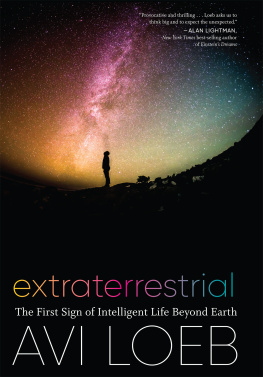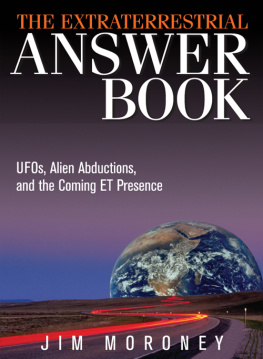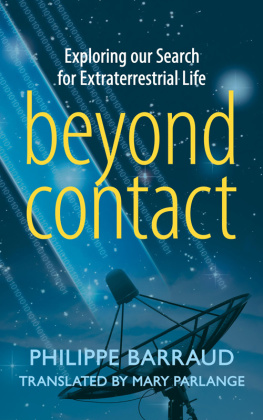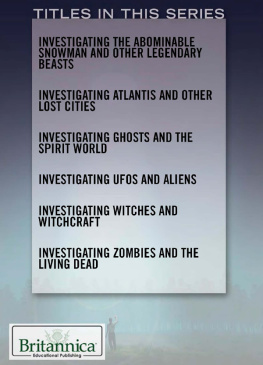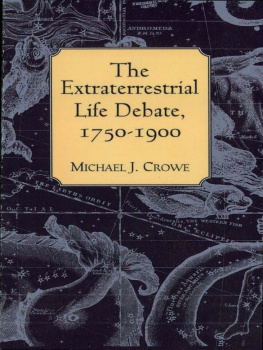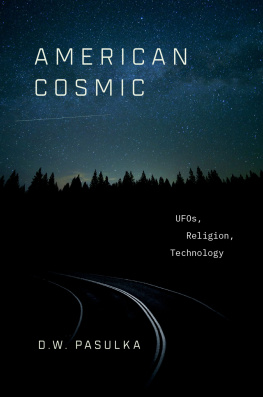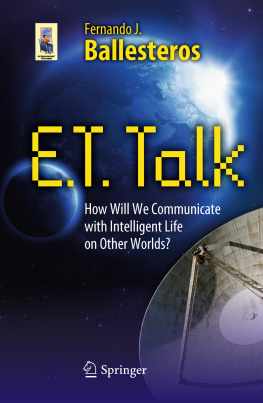Avi Loeb - Extraterrestrial: The First Sign of Intelligent Life Beyond Earth
Here you can read online Avi Loeb - Extraterrestrial: The First Sign of Intelligent Life Beyond Earth full text of the book (entire story) in english for free. Download pdf and epub, get meaning, cover and reviews about this ebook. year: 2021, publisher: HMH Books, genre: Religion. Description of the work, (preface) as well as reviews are available. Best literature library LitArk.com created for fans of good reading and offers a wide selection of genres:
Romance novel
Science fiction
Adventure
Detective
Science
History
Home and family
Prose
Art
Politics
Computer
Non-fiction
Religion
Business
Children
Humor
Choose a favorite category and find really read worthwhile books. Enjoy immersion in the world of imagination, feel the emotions of the characters or learn something new for yourself, make an fascinating discovery.
Extraterrestrial: The First Sign of Intelligent Life Beyond Earth: summary, description and annotation
We offer to read an annotation, description, summary or preface (depends on what the author of the book "Extraterrestrial: The First Sign of Intelligent Life Beyond Earth" wrote himself). If you haven't found the necessary information about the book — write in the comments, we will try to find it.
Avi Loeb: author's other books
Who wrote Extraterrestrial: The First Sign of Intelligent Life Beyond Earth? Find out the surname, the name of the author of the book and a list of all author's works by series.
Extraterrestrial: The First Sign of Intelligent Life Beyond Earth — read online for free the complete book (whole text) full work
Below is the text of the book, divided by pages. System saving the place of the last page read, allows you to conveniently read the book "Extraterrestrial: The First Sign of Intelligent Life Beyond Earth" online for free, without having to search again every time where you left off. Put a bookmark, and you can go to the page where you finished reading at any time.
Font size:
Interval:
Bookmark:
Copyright 2021 by Avi Loeb
All rights reserved
For information about permission to reproduce selections from this book, write to or to Permissions, Houghton Mifflin Harcourt Publishing Company, 3 Park Avenue, 19th Floor, New York, New York 10016.
hmhbooks.com
Library of Congress Cataloging-in-Publication Data
Names: Loeb, Abraham, author.
Title: Extraterrestrial : the first sign of intelligent life beyond Earth / Avi Loeb.
Description: Boston : Houghton Mifflin Harcourt, 2021. | Includes bibliographical references and index.
Identifiers: LCCN 2020023329 (print) | LCCN 2020023330 (ebook) | ISBN 9780358278146 (hardcover) | ISBN 9780358393788 | ISBN 9780358394570 | ISBN 9780358274551 (ebook)
Subjects: LCSH: Extraterrestrial beings. | Life on other planets. | Oumuamua (Interstellar object)
Classification: LCC QB54 .L63 2021 (print) | LCC QB54 (ebook) | DDC 576.8/39dc23
LC record available at https://lccn.loc.gov/2020023329
LC ebook record available at https://lccn.loc.gov/2020023330
Cover design by Martha Kennedy
Cover photograph Mohaimen Wareth / Getty Images
Author photograph Olivia Falcigno
v2.0121
To my three muses, Ofrit, Klil, and Lotem, and everyone else out there...
When you get a chance, step outside and admire the universe. This is best done at night, of course. But even when the only celestial object we can make out is the noontime Sun, the universe is always there, awaiting our attention. Just looking up, I find, helps change your perspective.
The view over our heads is most majestic at nighttime, but this is not a quality of the universe; rather, it is a quality of humankind. In the welter of daytime concerns, most of us spend a majority of our hours attentive to what is a few feet or yards in front of us; when we think of what is above us, most often its because were concerned about the weather. But at night, our terrestrial worries tend to ebb, and the grandeur of the moon, the stars, the Milky Way, andfor the fortunate among usthe trail of a passing comet or satellite become visible to backyard telescopes and even the naked eye.
What we see when we bother to look up has inspired humanity for as far back as recorded history. Indeed, it has recently been surmised that forty-thousand-year-old cave paintings throughout Europe show that our distant ancestors tracked the stars. From poets to philosophers, theologians to scientists, we have found in the universe provocations for awe, action, and the advancement of civilization. It was the nascent field of astronomy, after all, that was the impetus for the scientific revolution of Nicolaus Copernicus, Galileo Galilei, and Isaac Newton that removed the Earth from the center of the physical universe. These scientists were not the first to advocate for a more self-deprecating view of our world, but unlike the philosophers and theologians who preceded them, they relied on a method of evidence-backed hypotheses that ever since has been the touchstone of human civilizations advancement.
I have spent most of my professional career being rigorously curious about the universe. Directly or indirectly, everything beyond the Earths atmosphere falls within the scope of my day job. At the time of this writing, I serve as chair of Harvard Universitys Department of Astronomy, founding director of Harvards Black Hole Initiative, director of the Institute for Theory and Computation within the Harvard-Smithsonian Center for Astrophysics, chair of the Breakthrough Starshot Initiative, chair of the Board on Physics and Astronomy of the National Academies, a member of the advisory board for the digital platform Einstein: Visualize the Impossible from the Hebrew University of Jerusalem, and a member of the Presidents Council of Advisors on Science and Technology in Washington, DC. It is my good fortune to work alongside many exceptionally talented scholars and students as we consider some of the universes most profound questions.
This book confronts one of these profound questions, arguably the most consequential: Are we alone? Over time, this question has been framed in different ways. Is life here on Earth the only life in the universe? Are humans the only sentient intelligence in the vastness of space and time? A better, more precise framing of the question would be this: Throughout the expanse of space and over the lifetime of the universe, are there now or have there ever been other sentient civilizations that, like ours, explored the stars and left evidence of their efforts?
I believe that in 2017, evidence passed through our solar system that supports the hypothesis that the answer to the last question is yes. In this book, I look at that evidence, test that hypothesis, and ask what consequences might follow if scientists gave it the same credence they give to conjectures about supersymmetry, extra dimensions, the nature of dark matter, and the possibility of a multiverse.
But this book also asks another question, in some ways a more difficult one. Are we, both scientists and laypeople, ready? Is human civilization ready to confront what follows our accepting the plausible conclusion, arrived at through evidence-backed hypotheses, that terrestrial life isnt unique and perhaps not even particularly impressive? I fear the answer is no, and that prevailing prejudice is a cause for concern.
As is true for many professions, fashionable trends and conservatism when confronting the unfamiliar are evident throughout the scientific community. Some of that conservatism stems from a laudable instinct. The scientific method encourages reasonable caution. We make a hypothesis, gather evidence, test that hypothesis against the available evidence, and then refine the hypothesis or gather more evidence. But fashions can discourage the consideration of certain hypotheses, and careerism can direct attention and resources toward some subjects and away from others.
Popular culture hasnt helped. Science fiction books and films frequently depict extraterrestrial intelligence in a way that most serious scientists find laughable. Aliens lay waste to Earths cities, snatch human bodies, or, through torturously oblique means, endeavor to communicate with us. Whether they are malevolent or benevolent, aliens often possess superhuman wisdom and have mastered physics in ways that permit them to manipulate time and space so they can crisscross the universesometimes even a multiversein a blink. With this technology, they frequent solar systems, planets, and even neighborhood bars that teem with sentient life. Over the years, I have come to believe that the laws of physics cease to apply in only two places: singularities and Hollywood.
Personally, I do not enjoy science fiction when it violates the laws of physics; I like science and I like fiction but only when they are honest, without pretensions. Professionally, I worry that sensationalized depictions of aliens have led to a popular and scientific culture in which it is acceptable to laugh off many serious discussions of alien life even when the evidence clearly indicates that this is a topic worthy of discussion; indeed, one that we ought to be discussing now more than ever.
Are we the only intelligent life in the universe? Science fiction narratives have prepared us to expect that the answer is no and that it will arrive with a bang; scientific narratives tend to avoid the question entirely. The result is that humans are woefully ill prepared for an encounter with an extraterrestrial counterpart. After the credits roll and we leave the movie theater and look up at the night sky, the contrast is jarring. Above us we see mostly empty, seemingly lifeless space. But appearances can be deceiving, and for our own good, we cannot allow ourselves to be deceived any longer.
Font size:
Interval:
Bookmark:
Similar books «Extraterrestrial: The First Sign of Intelligent Life Beyond Earth»
Look at similar books to Extraterrestrial: The First Sign of Intelligent Life Beyond Earth. We have selected literature similar in name and meaning in the hope of providing readers with more options to find new, interesting, not yet read works.
Discussion, reviews of the book Extraterrestrial: The First Sign of Intelligent Life Beyond Earth and just readers' own opinions. Leave your comments, write what you think about the work, its meaning or the main characters. Specify what exactly you liked and what you didn't like, and why you think so.

